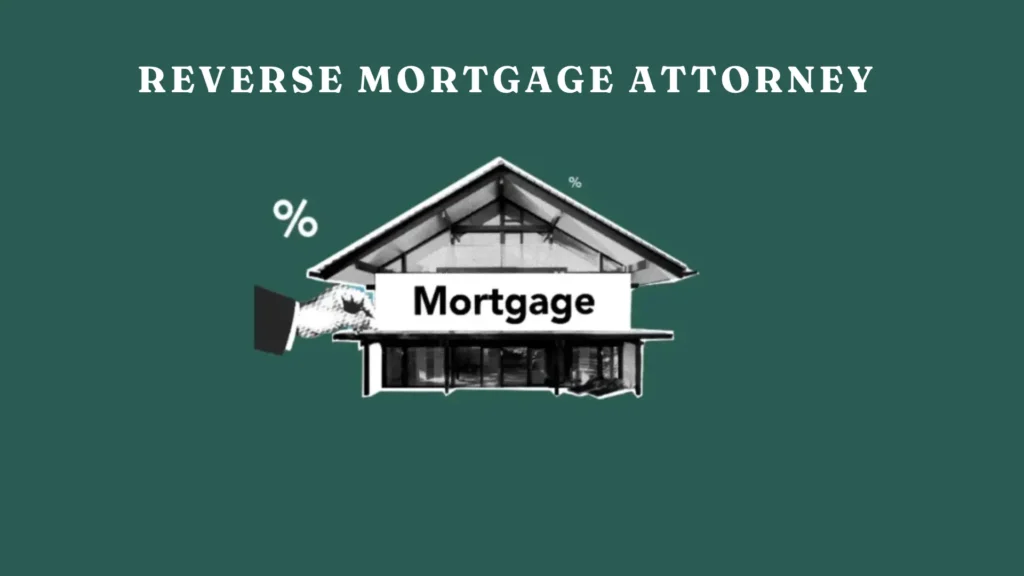A reverse mortgage is an age-based financial chance provided for homeowners aged 62 years and above that enable them to access home equity without necessarily losing title or ownership of their house. Terms and complexities that define a reverse mortgage most often demand expert guidance on making a fair agreement, keeping the long-term objectives of the homeowner in consideration. Here comes the need for a reverse mortgage attorney. Let’s delve a little deeper into the role of reverse mortgage attorneys, benefits offered, and important questions to ask when looking for an attorney.
What is a Reverse Mortgage?
A reverse mortgage is a loan which allows homeowners to tap part of the equity in their home as loan proceeds, generally tax-free income. Unlike the conventional mortgage where money paid for the home is amortised over a certain period by the owner in successive monthly payments, reverse mortgage money is never paid back during the homeowner’s lifetime; rather, repayments are made upon the homeowner’s leaving his or her home, either by selling it, being evicted, or dying. Such an amazing financial product is useful to a person, but on the flip side, poses a threat of becoming debt-ridden from interest accumulation and to the heirs.

Why Do You Need a Reverse Mortgage Attorney?
Reverse mortgages have technicalities that are sometimes hard to understand. An attorney for a reverse mortgage gives the homeowner very critical legal insight, such as knowing the language of the contract, the risks involved, and any state-specific regulations. Here are some key areas where an attorney’s guidance proves invaluable:
Understanding Complex Terms and Conditions: Reverse mortgage agreements are very detailed, often having clauses about repayment conditions, property maintenance, and structuring payments.
State and Federal Laws Navigation: Rules and regulations can vary greatly, and experienced attorneys ensure they are in compliance with federal requirements such as HUD guidelines and state-specific mortgage regulations.
Protection of Rights and Interests of Heirs: Many homeowners would like to pass down their home to the heirs, and an attorney ensures that the terms of the mortgage are protecting the rights of family members.
Negotiating Good Conditions with the Lenders: Lawyers may negotiate terms for a mortgage loan that reduces any undesirable clauses affecting a homeowner’s financial stability.
Also Check: Reverse Mortgage in Florida – Unlock Home Equity Today!
Also Check: Unlock Cash with a Reverse Mortgage on Mobile Home
Also Check: Reverse Mortgage Nightmares – What You Need to Know Now!
Also Check: Unlock Cash Flow – Reverse Mortgages for Manufactured Homes
How a Reverse Mortgage Attorney Helps in Various Mortgage Options?
Home Equity Conversion Mortgage (HECM)
HECMs are the most popular type of reverse mortgage, which is insured by the Federal Housing Administration. An attorney who specialises in HECMs will guide a homeowner through strict eligibility requirements, explain fees associated with them, and help mitigate risks tied to variable interest rates.
Proprietary Reverse Mortgages
Typically appropriate for high-value property owners, proprietary reverse mortgages offered by private lenders do not usually have federal insurance backing. Often not insured, this type of reverse mortgage may require homeowners to take some legal advice in making them weigh terms, fees, and risks.
Single-purpose Reverse Mortgages
Often administered by non-profit institutions or the government, single-purpose reverse mortgages finance one purpose-one home repair, for example. Lawyers can review these agreements to ensure that there are proper homeowners who actually meet program requirements and have conditions loaned that suffice to serve their financial purpose.
How Much Experience Do You Have with Reverse Mortgages?
Look for a lawyer who specialises in reverse mortgages rather than general real estate law. Make sure the attorney is aware of which state-specific regulations apply in your state and what’s required by HUD.
How Will You Protect My Heirs’ Interests?
Explain how the attorney could help protect your family’s financial future while securing your loan
What Are Your Fees?
Legal fees vary; by understanding your attorney’s fee structure, you can better anticipate this cost.
Can You Negotiate Terms with My Lender? Confirm whether the attorney is willing to negotiate terms on your behalf to get a fair deal.
Benefits of Getting a Reverse Mortgage Attorney Early
Early legal consultation will eliminate future complications. This means that the homeowners can make the right decisions and also tailor their loan conditions. Here are some benefits of getting an attorney early on:
Identification of Hidden Charges: Lawyers can flag unnecessary or excessive charges and therefore reduce the overall cost of the loan.
Negotiation of Better Terms: Early intervention allows lawyers more space to negotiate better terms, especially for proprietary loans.
Avoidance of Costly Misunderstandings: Lawyers explain technical terms in simpler words so that there are no costly misunderstandings resulting from unclear terms.
Myths about Reverse Mortgages
There are so many myths surrounding reverse mortgages, which can create confusion and, in some cases, financial hardship. Here is how a reverse mortgage attorney can dispel those myths:
Myth: Heirs Will Lose Their Inheritance – Although reverse mortgages do affect inheritance, it does not always eliminate the inheritance. Attorneys can explain strategies to preserve inheritance value.
Myth: The Bank Owns the Home – In a reverse mortgage, the homeowner owns the home, although the lender does have a lien.
Myth: Reverse Mortgages Are Only for Low-Income Homeowners – This financial tool can benefit homeowners in all income brackets, offering a strategic way to access equity.

Choosing the Correct Attorney in Reverse Mortgages
Selecting a qualified reverse mortgage attorney is crucial in ensuring sound advice and successful outcomes. Below are some steps in selecting a reputable attorney:
Verify Qualifications and Credentials:
One should look for licensed attorneys with certifications in real estate law, financial planning, or elder law.
Study Past Cases:
Attorneys with good outcomes of previous cases and customer testimonials reveal reliability and experience.
Approach Professional Associations:
Organisations such as the National Academy of Elder Law Attorneys often list qualified attorneys who are experienced in reverse mortgages.
Schedule Initial Consultations:
Meeting with a few attorneys will allow the homeowner to gauge compatibility, communication, and transparency. Potential
Challenges of Reverse Mortgage Agreements
Even with professional guidance, issues can still arise. The following are ways an attorney can help mitigate common challenges:
Variable Interest Rates: Most reverse mortgages have a variable interest rate. This is one area where the attorney can explain the potential long-term implications of variable changes.
Lender’s Property Upkeep Requirements: A lender may require property upkeep from the borrower. The attorney can explain to avoid a penalty.
Final Thoughts:
The Reverse Mortgage Attorney’s Role in Empowering Financial Decision-Making A reverse mortgage attorney makes a big difference for seniors, allowing them to take decisions that are not only wise but also prudent regarding financial matters. In simple terms, they are the best translators of legal jargon while fighting for homeowners’ rights, protecting against various potential risks, and thereby enabling the homeowner’s legacy for generations to come. In this way, senior citizens feel confident enough while making their way through complex financial land, knowing full well that their financial interests are protected as well as their family’s interest.
